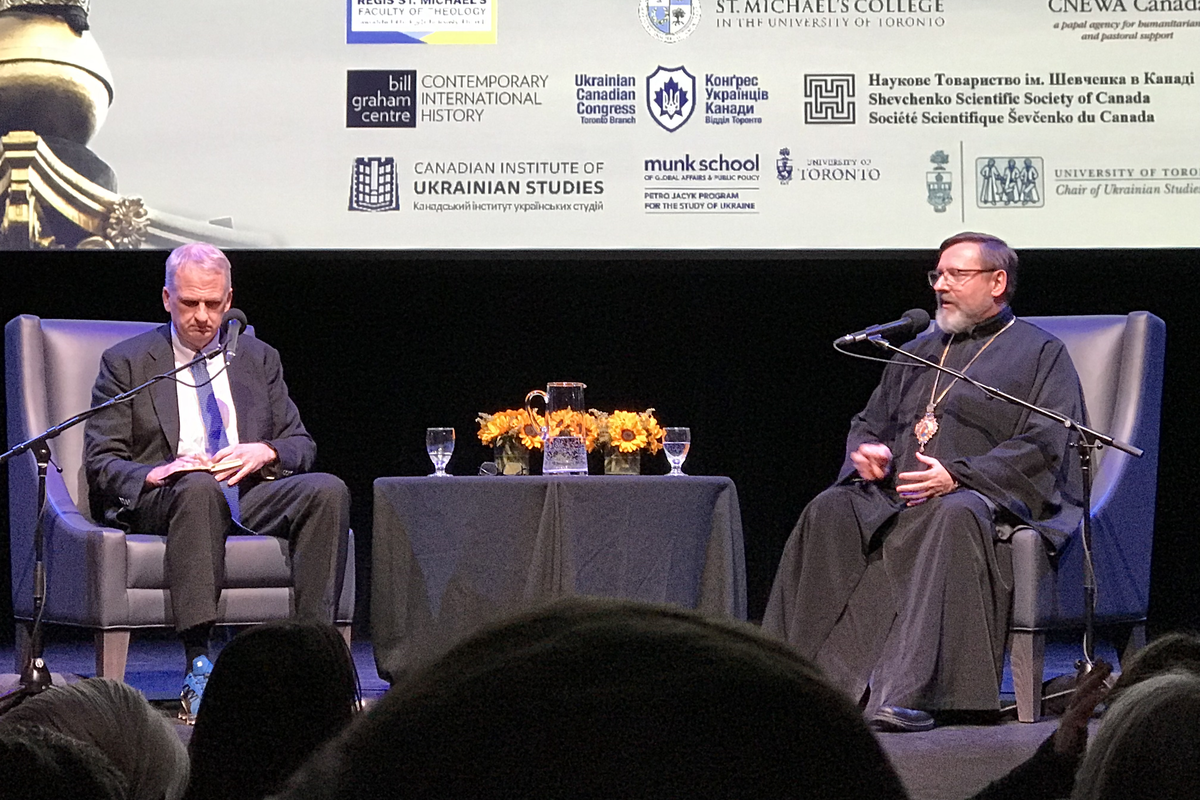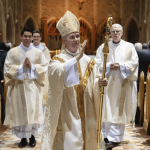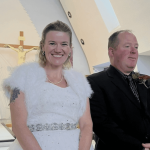TORONTO — On the heels of the third anniversary of Russia’s war against Ukraine, the leader of the Ukrainian Greek Catholic Church urged Canadians to be “bearers of truth” and to “stand against the temptation to turn inward” and “focus only on national concerns.”
“Ukraine is halfway around the world, but the Ukrainian people are suffering and need the support of those who enjoy peace,” said Major Archbishop Sviatoslav Shevchuk of Kyiv-Halych, underlining that nearly 13 million people in Ukraine require humanitarian assistance, according to the United Nations.
“In this context, stand against the temptation to turn inward; the temptation that would have us forget our brothers and sisters in need in foreign lands; that would have us focus only on national concerns,” he said.
The archbishop appealed for a just peace for Ukraine during a public lecture on Feb. 25 that drew a sellout crowd of more than 500 to the Isabel Bader Theatre on the University of Toronto campus.
His lecture, titled “War, Peace and Truth,” was followed by comments and conversation with best-selling author and historian Timothy Snyder, an expert in Eastern and Central European history. The American scholar currently holds the Chair in Modern European History at the University of Toronto’s Munk School of Global Affairs and Public Policy.
The archbishop was in Canada for a meeting of the Ukrainian Greek Catholic Synod and public events marking the third anniversary of the war in Ukraine, after spending the previous week in the United States. On 25 February, the Ukrainian prelate also received an honorary doctorate from the University of St. Michael’s College at the University of Toronto, which he dedicated to the people of Ukraine.
The event was organized by Metropolitan Andrey Sheptytsky Institute for Eastern Christian Studies in the University of St. Michael’s College. Co-sponsors included the Ukrainian Catholic Women’s League and Catholic Near East Welfare Association.
The archbishop said a just peace requires “the honest recognition of the violence and dehumanization that has befallen the Ukrainian people,” and “not only material support, but an unshakeable and unbending commitment to defending the truth.”
In defense of truth, he urged his audience to seek reliable sources of information and not fall for Russian propaganda.
“Let us not be deceived about the ends Russia and Putin pursue. Putin has unambiguously, explicitly expressed his genocidal intentions and geopolitical goals,” he said, goals informed by Russia’s ideology of “Russkiy Mir” that denies the existence of Ukraine and calls for its eradication.
“I ask that you refuse to subscribe to or propagate the lies that have been contributing to the suppression, degradation and elimination of my people,” he said. “We must be sure that, in the face of lies, we are bearers of truth.”
He also asked for prayers for an end to the war and “the conversion of those who propagate lies and commit atrocities.”
The archbishop said he was convinced, after three years of war, that the only way to “succeed in forcing Putin to abandon his plans” to “obliterate an international order based on law and human rights” is “our moral clarity, our unity in courage and our joint decisive action, by God’s grace.”
If Russia were to succeed in occupying Ukraine, the Ukrainian Greek Catholic Church would be liquidated once again, he added, referring to the exile, imprisonment and forced conversion of Eastern Catholics to Russian Orthodoxy under former Russian regimes.
In the current war, Ukrainian Greek Catholic churches and monasteries in Russian-occupied territories have been destroyed or confiscated and priests have been imprisoned and tortured.
“In God’s Providence, we have survived each attempt at annihilation, and we live to witness to the truth of the Gospel,” he said.
In response, Snyder reflected on the experience of welcoming Ukrainians within the concept of welcoming “the stranger” and the “truth of the neighbour” in reference to the parable of the Good Samaritan.
“The Good Samaritan took a risk,” he said. “If you stop and you help someone who’s lying on a ditch, you are in fact taking some kind of a risk.
“And it strikes me that as Ukrainians for many of us have shifted from being strangers to being neighbours, they’ve helped us to recognize that there is really no truth without risk, that the things that come very easily are very seldom true.
“It’s difficult, I think, for people who are beyond Ukraine to recognize risk and courage, when we are not sure that we would show that courage ourselves,” he said, positing that at
the heart of the “difficulties some of my fellow Americans” may have regarding the war in Ukraine is that “we have trouble accepting that other people might take risks that we wouldn’t take.”
“And from that cowardice, from that difficulty of recognizing the stranger also comes an inability to recognize yourself,” he continued. “And as you fail to recognize yourself, you find tempting the lies that others tell. And in this way, Americans find their way back into this circle of untruth begun by Mr. Putin at the beginning of this war.”
Archbishop Shevchuk concluded with a theological reflection on the history of Ukraine and the current war.
“Maybe, right now, we can more and more deeply understand that Ukrainian culture is a Paschal culture, which gave us strength to survive and to rise again after many destructions,” he said.
“Each day, we are looking into the eyes of death,” he said. “In Kyiv, each night, we have new drones coming on us, new rockets. We never know if we will survive until the next day, but we still have our plans for the next day. That creates a special spirituality because you have to be ready to die each day in the hope to inherit the … resurrection.
“The risen Christ is in our veins,” he said. “He is in us, and Christian hope is all about the hope in the resurrection.”
Read the full text of Archbishop Shevchuk’s talk. Listen to a broadcast of the event on CBC Ideas.
(Laura Ieraci is editor of ONE magazine.)
Republished with permission of CNEWA.




